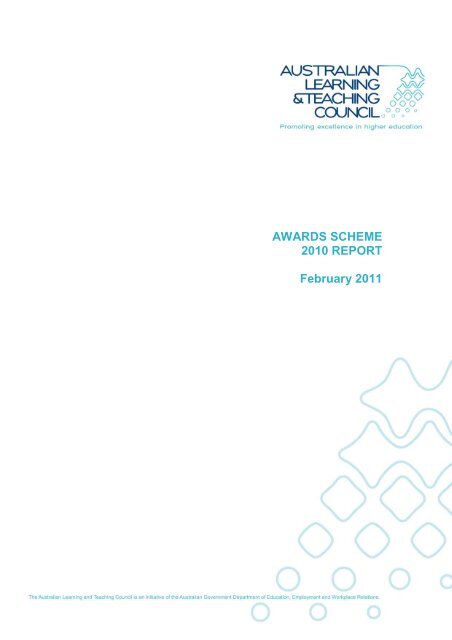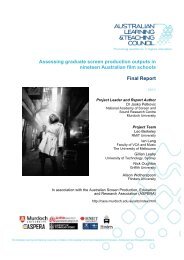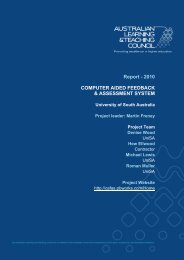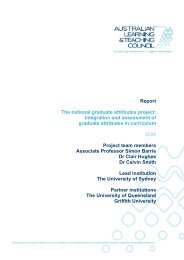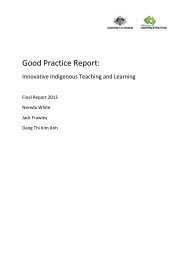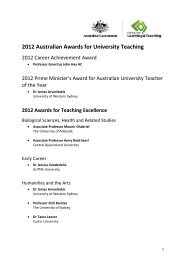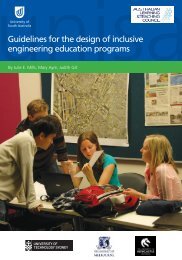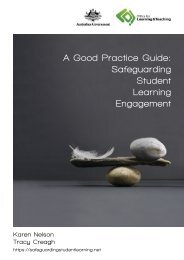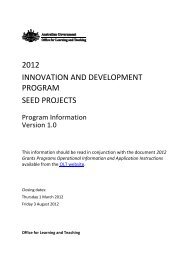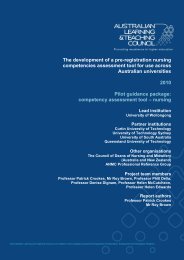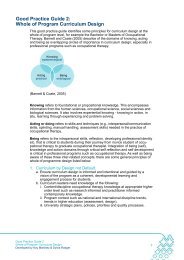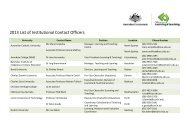2010 Awards Scheme Report - Office for Learning and Teaching
2010 Awards Scheme Report - Office for Learning and Teaching
2010 Awards Scheme Report - Office for Learning and Teaching
Create successful ePaper yourself
Turn your PDF publications into a flip-book with our unique Google optimized e-Paper software.
2008 <strong>Awards</strong> <strong>Scheme</strong> <strong>Report</strong> Page 1<br />
AWARDS SCHEME<br />
<strong>2010</strong> REPORT<br />
February 2011
Table of Contents<br />
1.0 The ALTC <strong>Awards</strong> <strong>Scheme</strong> 2<br />
2.0 Citations 5<br />
3.0 Program <strong>Awards</strong> 8<br />
4.0 <strong>Teaching</strong> <strong>Awards</strong> 10<br />
5.0 The Prime Minister’s Award <strong>for</strong><br />
Australian University Teacher of the Year 12<br />
6.0 Career Achievement Award 13<br />
7.0 Conference funding 14<br />
8.0 Events 15<br />
9.0 Appendix 1 <strong>2010</strong> Citation <strong>and</strong> Award winners 16<br />
10.0 Appendix 2 Cumulative <strong>Scheme</strong> data 2006-<strong>2010</strong> 34<br />
<strong>2010</strong> <strong>Awards</strong> <strong>Scheme</strong> <strong>Report</strong> 1
1.0 The ALTC <strong>Awards</strong> <strong>Scheme</strong><br />
Overview<br />
The Australian <strong>Awards</strong> <strong>for</strong> University <strong>Teaching</strong> (AAUT) scheme is one of the Australian<br />
<strong>Learning</strong> <strong>and</strong> <strong>Teaching</strong> Council’s (ALTC’s) designated responsibilities, as noted in in<br />
Trans<strong>for</strong>ming <strong>Learning</strong> <strong>and</strong> <strong>Teaching</strong> in Australian Higher Education: ALTC Strategic<br />
Plan <strong>2010</strong>-2013.<br />
The awards are an important part of the ALTC’s mission to promote <strong>and</strong> advance<br />
learning <strong>and</strong> teaching in Australian higher education.<br />
The scheme comprises five award programs that recognise teaching excellence <strong>and</strong><br />
outst<strong>and</strong>ing contributions to student learning. These five awards are:<br />
• Citations <strong>for</strong> Outst<strong>and</strong>ing Contributions to Student <strong>Learning</strong>;<br />
• <strong>Awards</strong> <strong>for</strong> Programs that Enhance <strong>Learning</strong>;<br />
• <strong>Awards</strong> <strong>for</strong> <strong>Teaching</strong> Excellence;<br />
• Prime Minister’s Award <strong>for</strong> Australian University Teacher of the Year; <strong>and</strong><br />
• Career Achievement Award.<br />
The ALTC also provides funding <strong>for</strong> award recipients to present at conferences.<br />
Objectives<br />
The awards scheme has been specifically designed to achieve the following outcomes:<br />
• raise the profile <strong>and</strong> encourage recognition of the fundamental importance of<br />
teaching in higher education institutions <strong>and</strong> in the general community; <strong>and</strong><br />
• foster <strong>and</strong> acknowledge excellent teaching in higher education.<br />
Participation<br />
In the period 2006-10, participation in the citations <strong>and</strong> awards programs has been strong<br />
<strong>and</strong> consistent. Since its inception, the citations program has received nominations from<br />
more than 80 per cent of eligible institutions, with all nominating institutions making<br />
multiple nominations in <strong>2010</strong>. As might be expected, numbers of nominations received<br />
have been highest in an early year of the program (2007) but trends continue to indicate<br />
that approximately 300 nominations per annum can be expected.<br />
Significantly fewer nominations (73 from individuals, <strong>and</strong> six from teams) <strong>for</strong> teaching<br />
awards were received in <strong>2010</strong> than in 2009. It should be noted however, that the success<br />
rate <strong>for</strong> teaching award nominations has increased from 22 per cent in 2009, to 27 per<br />
cent in <strong>2010</strong>. One interpretation might be that more nominations of a higher quality were<br />
received in <strong>2010</strong> compared with those received in 2009. In the period 2006-10, more than<br />
60 per cent of institutions submitted nominations <strong>for</strong> teaching awards.<br />
The success rate of nominations <strong>for</strong> program awards has increased significantly from that<br />
seen in 2006 <strong>and</strong> appears relatively constant (25 per cent in 2007-10, with no more than<br />
2 per cent variation from the average rate in any one year during the period). While the<br />
proportion of eligible institutions submitting nominations declined from 60 per cent in 2006<br />
to 41 per cent in 2008, it has increased annually since 2008 to 50 per cent in <strong>2010</strong>. The<br />
proportion of institutions submitting more than one nomination declined from an average<br />
in the period 2006-2009 of 57 per cent to 48 per cent in <strong>2010</strong>. Two additional institutions,<br />
<strong>2010</strong> <strong>Awards</strong> <strong>Scheme</strong> <strong>Report</strong> 2
Holmesglen Institute of TAFE (Victoria) <strong>and</strong> Tabor College Inc, (Victoria), become eligible<br />
to apply <strong>for</strong> AAUT in <strong>2010</strong>, raising the number of eligible institutions from 44 to 46.<br />
Australian <strong>Awards</strong> <strong>for</strong> University <strong>Teaching</strong> Committee (AAUTC)<br />
membership, as at September <strong>2010</strong><br />
Professor John Hay AC Chair<br />
Professor Margaret Gardner AO<br />
Professor Stuart Campbell<br />
Professor John Rosenberg<br />
Vice-Chancellor <strong>and</strong> President,<br />
RMIT University<br />
Pro Vice-Chancellor (<strong>Learning</strong><br />
<strong>and</strong> <strong>Teaching</strong>), University of<br />
Western Sydney<br />
Deputy Vice-Chancellor<br />
(International <strong>and</strong> Future<br />
Students), La Trobe University<br />
Associate Professor Nereda White Australian Catholic University<br />
Ms Catherine V<strong>and</strong>ermark<br />
Group Manager, Higher<br />
Education Group, Department<br />
of Education, Employment <strong>and</strong><br />
Workplace Relations<br />
Ms Robin Pacey* Griffith University<br />
Mr Shaun Khoo* The University of Melbourne<br />
* For teaching, program <strong>and</strong> Prime Minister’s awards only<br />
ALTC Board<br />
Chair<br />
ALTC Board<br />
member<br />
Universities<br />
Australia<br />
nominee<br />
Universities<br />
Australia<br />
nominee<br />
Indigenous<br />
community<br />
representative<br />
Minister’s<br />
nominee<br />
Postgraduate<br />
student<br />
Undergraduate<br />
student<br />
The terms of the appointments of Professor Campbell <strong>and</strong> Professor Rosenberg expired<br />
on 31 December <strong>2010</strong>.<br />
Nomination <strong>and</strong> selection<br />
Nominations <strong>for</strong> citations, program <strong>and</strong> teaching awards are considered by at least two<br />
assessors, who provide general advice on the relative quality of the nominations to the<br />
AAUTC. Final decisions on all award recipients rest with the Committee. The ALTC Board<br />
determines recipients of the Career Achievement Award.<br />
Guidelines<br />
Guidelines <strong>for</strong> each program in the awards scheme in <strong>2010</strong>, including in<strong>for</strong>mation on the<br />
nomination process, were made available on the ALTC website in September 2009.<br />
The priority area <strong>for</strong> teaching awards in <strong>2010</strong> was internationalisation.<br />
The Committee has endorsed modifications to the guidelines <strong>for</strong> 2011 <strong>and</strong>, following<br />
approval by the Board, these were released in October <strong>2010</strong>. An early career category<br />
has been established in the Citations program <strong>and</strong> up to 10 Citations will be awarded in<br />
this category. There is no change to the overall number of Citations available (210).<br />
In 2011, 24 <strong>Awards</strong> <strong>for</strong> <strong>Teaching</strong> Excellence will be available (previously 27). The priority<br />
area <strong>for</strong> the <strong>Teaching</strong> <strong>Awards</strong> in 2011 is teaching large classes.<br />
<strong>2010</strong> <strong>Awards</strong> <strong>Scheme</strong> <strong>Report</strong> 3
The Program Award category Assessment <strong>and</strong> feedback has been discontinued (owing<br />
to the small number <strong>and</strong> poor quality of nominations in this category <strong>for</strong> at least the last<br />
three years). Nominations focussed on assessment may be made in the category<br />
Innovation in curricula. In recognition of the emerging importance of the area, a new<br />
category, Widening participation, has been added to the Program <strong>Awards</strong> in 2011.<br />
With the approval of the Board, the guidelines <strong>for</strong> Funding <strong>for</strong> award winners to present at<br />
conferences have been adapted to extend eligibility <strong>for</strong> funding from 2011 to the support<br />
of presentations by ALTC Fellows who have completed their programs.<br />
Feedback<br />
Written feedback on each unsuccessful nomination <strong>for</strong> a citation or an award was<br />
provided to Institutional Contact <strong>Office</strong>rs, in August or November, respectively.<br />
The committee approved Assessment reports <strong>for</strong> the Citations <strong>and</strong> <strong>Awards</strong> program <strong>for</strong><br />
release <strong>and</strong> these were published on the ALTC’s website during <strong>2010</strong>. The reports<br />
contain data on nominations as well as general comments by the assessors on the<br />
quality of nominations.<br />
Administration<br />
In <strong>2010</strong>, a custom-designed nomination management module of the ALTC’s Business<br />
In<strong>for</strong>mation Management System (BiMS) was launched. This module allowed significant<br />
improvement in the timely <strong>and</strong> accurate processing of citation <strong>and</strong> award nominations<br />
received in hard copy, <strong>and</strong> provided template-based reporting functions that better<br />
facilitated the assessment, decision-making <strong>and</strong> notification processes. Development of a<br />
portal <strong>for</strong> online submission of nominations commenced in <strong>2010</strong>, <strong>and</strong> will be available <strong>for</strong><br />
the 2011 Citations program.<br />
BiMS <strong>and</strong> the records management software TRIM enable ALTC to fulfil its recordkeeping,<br />
document management <strong>and</strong> storage <strong>and</strong> disposal obligations as a<br />
Commonwealth agency.<br />
Assessor Program<br />
All recipients of <strong>2010</strong> Citations, <strong>and</strong> <strong>Teaching</strong> <strong>and</strong> Program <strong>Awards</strong> have been invited to<br />
register as assessors. Those on the assessor register (which also includes nominees<br />
proposed by eligible institutions) may be called upon to assess nominations <strong>and</strong><br />
applications in the <strong>Awards</strong>, Fellowships <strong>and</strong> Grants programs.<br />
<strong>Scheme</strong> per<strong>for</strong>mance<br />
Cumulative scheme data <strong>for</strong> the period 2006-10 can be found in Appendix 2.<br />
<strong>2010</strong> <strong>Awards</strong> <strong>Scheme</strong> <strong>Report</strong> 4
2.0 Citations<br />
Overview<br />
Citations <strong>for</strong> Outst<strong>and</strong>ing Contributions to Student <strong>Learning</strong> recognise <strong>and</strong> reward the<br />
diverse contribution that individuals <strong>and</strong> teams make to the quality of student learning.<br />
Citations may be awarded to academic, general <strong>and</strong> sessional staff, <strong>and</strong> institutional<br />
associates, who have made significant contributions to student learning in a specific area<br />
of responsibility over a sustained period. Citations may be awarded <strong>for</strong> both direct <strong>and</strong><br />
indirect contribution, whether the contribution is general or more specific.<br />
There are no specified categories <strong>for</strong> citations. Each citation is unique <strong>and</strong> reflects the<br />
diversity of ways in which academic staff, general staff, sessional staff or institutional<br />
associates contribute to learning <strong>and</strong> teaching in higher education.<br />
This is the fourth year that citations have been conferred. Nominations <strong>for</strong> <strong>2010</strong> citations<br />
closed on Friday, 30 April <strong>2010</strong>. Up to 210 citations were available, each with a prize of<br />
$10,000 to be paid to the recipient’s institution. This year the available funding allowed no<br />
potential <strong>for</strong> this number to be exceeded.<br />
Nominations<br />
In <strong>2010</strong>, 297 nominations were received from 42 of the 46 eligible institutions (see Table<br />
1).<br />
Recipients<br />
In <strong>2010</strong>, a total of 193 citations were presented to staff from 40 of the 42 institutions that<br />
lodged nominations. A list of <strong>2010</strong> Citation recipients can be foundTable_8 in Appendix<br />
1.<br />
<strong>2010</strong> <strong>Awards</strong> <strong>Scheme</strong> <strong>Report</strong> 5
Table 1: Citations <strong>2010</strong>: nomination <strong>and</strong> recipient numbers (by institution)<br />
Institution Nom Rec<br />
The Australian National University 7 7<br />
University of Canberra 5 2<br />
ACT total 12 9<br />
Avondale College 0 0<br />
Charles Sturt University 5 4<br />
Macquarie University 9 4<br />
Southern Cross University 5 3<br />
The University of Sydney 7 4<br />
University of New Engl<strong>and</strong> 2 2<br />
The University of New South Wales 8 5<br />
The University of Newcastle 10 6<br />
University of Technology, Sydney 8 6<br />
University of Western Sydney 10 10<br />
University of Wollongong 9 7<br />
NSW total 73 51<br />
Batchelor Institute of Indigenous Tertiary Education 2 1<br />
Charles Darwin University 0 0<br />
NT total 2 1<br />
Bond University 10 2<br />
CQUniversity Australia 3 3<br />
Christian Heritage College 1 0<br />
Griffith University 10 8<br />
James Cook University 10 5<br />
Queensl<strong>and</strong> University of Technology 10 7<br />
The University of Queensl<strong>and</strong> 10 10<br />
University of Southern Queensl<strong>and</strong> 6 3<br />
University of the Sunshine Coast 10 6<br />
QLD total 70 44<br />
Flinders University 10 6<br />
Tabor College Inc. (SA) 2 0<br />
The University of Adelaide 10 5<br />
University of South Australia 10 7<br />
SA total 32 18<br />
University of Tasmania 7 5<br />
TAS total 7 5<br />
Deakin University 10 7<br />
Holmesglen Institute of TAFE 0 0<br />
La Trobe University 3 3<br />
Melbourne College of Divinity 0 0<br />
Monash University 9 5<br />
RMIT University 9 2<br />
Swinburne University of Technology 8 7<br />
Tabor College Inc. (VIC) 0 0<br />
The University of Melbourne 10 8<br />
University of Ballarat 4 2<br />
Victoria University 4 4<br />
VIC total 57 38<br />
<strong>2010</strong> <strong>Awards</strong> <strong>Scheme</strong> <strong>Report</strong> 6
Table 1: Citations <strong>2010</strong>: nomination <strong>and</strong> recipient numbers (by institution),<br />
continued<br />
Curtin University 7 7<br />
Edith Cowan University 4 2<br />
Murdoch University 9 3<br />
The University of Western Australia 9 6<br />
WA total 29 18<br />
Australian Catholic University 8 6<br />
The University of Notre Dame Australia 7 3<br />
National total 15 9<br />
AUSTRALIA total 297 193<br />
<strong>2010</strong> <strong>Awards</strong> <strong>Scheme</strong> <strong>Report</strong> 7
3.0 Program <strong>Awards</strong><br />
Overview<br />
<strong>Awards</strong> <strong>for</strong> Programs that Enhance <strong>Learning</strong> recognise learning <strong>and</strong> teaching support<br />
programs <strong>and</strong> services that make an outst<strong>and</strong>ing contribution to the quality of student<br />
learning <strong>and</strong> the quality of the student experience of higher education. The programs <strong>and</strong><br />
services receiving program awards must have demonstrated their effectiveness through<br />
rigorous evaluation <strong>and</strong> will set benchmarks <strong>for</strong> similar activities in other institutions.<br />
Nominations <strong>for</strong> <strong>2010</strong> <strong>Awards</strong> <strong>for</strong> Programs that Enhance <strong>Learning</strong> closed on Friday, 9<br />
July. A maximum of 14 awards were available.<br />
The program award categories are:<br />
1. Assessment <strong>and</strong> feedback, encompassing assessment initiatives that<br />
encourage students to develop <strong>and</strong> demonstrate higher-order skills <strong>and</strong> attitudes<br />
such as academic independence, ethical practices <strong>and</strong> values, <strong>and</strong> critical<br />
thinking <strong>and</strong> feedback that is timely <strong>and</strong> supports students’ learning development;<br />
2. Educational partnerships <strong>and</strong> collaborations with other organisations,<br />
encompassing partnerships between universities, <strong>and</strong> universities <strong>and</strong> other<br />
organisations – such as schools, professional bodies, businesses <strong>and</strong> industries<br />
– in collaborative approaches to learning <strong>and</strong> teaching;<br />
3. The first year experience, encompassing the academic <strong>and</strong> social transition to<br />
higher education, learning <strong>and</strong> teaching within large student groups, <strong>and</strong> the<br />
quality of the first year student experience;<br />
4. Flexible learning <strong>and</strong> teaching, encompassing approaches to learning <strong>and</strong><br />
teaching that af<strong>for</strong>d flexibility in time, place <strong>and</strong>/or mode of learning;<br />
5. Innovation in curricula, learning <strong>and</strong> teaching, encompassing innovations that<br />
encourage novel approaches to learning <strong>and</strong> teaching, innovations that<br />
encourage or support multidisciplinary, research-based learning <strong>and</strong> teaching<br />
approaches, innovations that utilise the potential of new <strong>and</strong>/or emerging<br />
technologies;<br />
6. Postgraduate education, encompassing programs that focus on postgraduate<br />
students, postgraduate coursework learning <strong>and</strong> teaching, postgraduate research<br />
supervision <strong>and</strong> research higher degree c<strong>and</strong>idature, <strong>and</strong> postgraduate learning<br />
support; <strong>and</strong><br />
7. Services supporting student learning, encompassing services directly related<br />
to student learning such as services <strong>for</strong> specific groups of students, in<strong>for</strong>mation<br />
access, course advising, language <strong>and</strong> learning support, counselling <strong>and</strong><br />
disability support.<br />
Each successful nominee across the seven categories receives a program award <strong>and</strong><br />
$25,000, paid to the recipient’s institution.<br />
Nominations<br />
In <strong>2010</strong>, 42 nominations were received from 23 of the 46 eligible institutions. A list of<br />
program award nominations received <strong>and</strong> awards made, by category, can be found in<br />
Table 2. A list of program award nominations received <strong>and</strong> awards made, by institution,<br />
can be found in Table 3.<br />
<strong>2010</strong> <strong>Awards</strong> <strong>Scheme</strong> <strong>Report</strong> 8
Recipients<br />
<strong>Awards</strong> were presented to 10 recipients from nine institutions (See Table 2 <strong>and</strong> Table 3),<br />
including the first such award to Victoria University. A list of all <strong>2010</strong> Program Award<br />
recipients can be found in Appendix 1.<br />
Table 2: Program <strong>Awards</strong> <strong>2010</strong>: nominations <strong>and</strong> recipients (by category)<br />
Category Nominations Recipients<br />
Assessment <strong>and</strong> feedback 3 0<br />
Educational partnerships <strong>and</strong> collaborations with<br />
8 3<br />
other organisations<br />
The first year experience 7 2<br />
Flexible learning <strong>and</strong> teaching 2 2<br />
Innovation in curricula, learning <strong>and</strong> teaching 12 1<br />
Postgraduate education 3 1<br />
Services supporting student learning 7 1<br />
Total 42 10<br />
Table 3: Program <strong>Awards</strong> <strong>2010</strong>: nominations <strong>and</strong> recipients (by institution)<br />
Institution Nominations Recipients<br />
Australian Catholic University 1 0<br />
Curtin University 1 1<br />
Deakin University 2 0<br />
Edith Cowan University 1 0<br />
Flinders University 3 0<br />
Griffith University 1 0<br />
James Cook University 1 0<br />
Macquarie University 2 1<br />
Monash University 3 0<br />
Queensl<strong>and</strong> University of Technology 4 2<br />
Swinburne University of Technology 2 1<br />
The Australian National University 1 0<br />
The University of Adelaide 1 0<br />
The University of Melbourne 2 0<br />
The University of Notre Dame Australia 1 0<br />
The University of Queensl<strong>and</strong> 4 1<br />
The University of Western Australia 4 1<br />
University of South Australia 1 0<br />
University of Southern Queensl<strong>and</strong> 1 0<br />
University of Tasmania 2 0<br />
University of Western Sydney 2 1<br />
University of Wollongong 1 1<br />
Victoria University 1 1<br />
Total 42 10<br />
<strong>2010</strong> <strong>Awards</strong> <strong>Scheme</strong> <strong>Report</strong> 9
4.0 <strong>Teaching</strong> <strong>Awards</strong><br />
Overview<br />
<strong>Awards</strong> <strong>for</strong> <strong>Teaching</strong> Excellence celebrate a group of the nation’s most outst<strong>and</strong>ing<br />
university teachers in their fields. <strong>Teaching</strong> awards give recognition to teachers<br />
(individuals <strong>and</strong> teams) renowned <strong>for</strong> the excellence of their teaching, who have<br />
outst<strong>and</strong>ing presentation skills <strong>and</strong> who have made a broad <strong>and</strong> deep contribution to<br />
enhancing the quality of learning <strong>and</strong> teaching in higher education.<br />
Nominations <strong>for</strong> <strong>2010</strong> <strong>Awards</strong> <strong>for</strong> <strong>Teaching</strong> Excellence closed on Friday, 9 July. A<br />
maximum of 27 awards were available.<br />
There are eight categories of teaching awards:<br />
1. Biological sciences, health <strong>and</strong> related studies (including agriculture, animal<br />
husb<strong>and</strong>ry, medicine, nursing, etc.);<br />
2. Early career;<br />
3. Humanities <strong>and</strong> the arts;<br />
4. Law, economics, business <strong>and</strong> related studies;<br />
5. Neville Bonner Award/s <strong>for</strong> Indigenous education;<br />
6. Physical sciences <strong>and</strong> related studies (including architecture, building <strong>and</strong><br />
planning, engineering, computing <strong>and</strong> in<strong>for</strong>mation science);<br />
7. Social sciences (including education); <strong>and</strong><br />
8. Priority area <strong>for</strong> <strong>2010</strong>: internationalisation.<br />
Each successful nominee across the eight categories receives a teaching award, <strong>and</strong><br />
$25,000 which is paid to the recipient’s institution.<br />
Nominations<br />
Seventy-nine nominations were received from 28 of the 46 eligible institutions by the<br />
closing date. A list of teaching award nominations received <strong>and</strong> awards made, by<br />
category can be found in Table 4. A list of teaching award nominations received <strong>and</strong><br />
awards made, by institution, can be found in Table 5.<br />
Recipients<br />
In <strong>2010</strong>, 21 awards were made to recipients from 28 institutions (see Table 4 <strong>and</strong> Table<br />
5), including the first such award to a staff member of Charles Darwin University. A list of<br />
all recipients can be found in Table 10 in Appendix 1.<br />
<strong>2010</strong> <strong>Awards</strong> <strong>Scheme</strong> <strong>Report</strong> 10
Table 4: <strong>Teaching</strong> <strong>Awards</strong> <strong>2010</strong>: nominations <strong>and</strong> recipients (by category)<br />
Category Nominations Recipients<br />
Biological sciences, health <strong>and</strong> related studies 15 4<br />
Early career 11 2<br />
Humanities <strong>and</strong> the arts 9 3<br />
Law, economics, business <strong>and</strong> related studies 16 3<br />
Neville Bonner award/s <strong>for</strong> Indigenous education 2 2<br />
Physical sciences <strong>and</strong> related studies 9 1<br />
Social sciences 12 4<br />
Priority area <strong>2010</strong> − internationalisation 5 2<br />
Total 79 21<br />
Table 5: <strong>Teaching</strong> <strong>Awards</strong> <strong>2010</strong>: nominations <strong>and</strong> recipients (by institution)<br />
Institution Nominations Recipients<br />
Bond University 1 0<br />
Charles Darwin University 1 1<br />
CQUniversity Australia 2 0<br />
Curtin University 5 3<br />
Deakin University 2 0<br />
Edith Cowan University 3 0<br />
Flinders University 2 0<br />
Griffith University 3 2<br />
La Trobe University 2 0<br />
Macquarie University 5 0<br />
Monash University 3 1<br />
Queensl<strong>and</strong> University of Technology 6 3<br />
Southern Cross University 1 0<br />
Tabor College Inc. (SA) 2 0<br />
The Australian National University 3 2<br />
The University of Adelaide 7 1<br />
The University of Melbourne 4 0<br />
The University of New South Wales 1 1<br />
The University of Newcastle 4 3<br />
The University of Notre Dame Australia 1 0<br />
The University of Queensl<strong>and</strong> 7 2<br />
The University of Sydney 1 0<br />
The University of Western Australia 6 1<br />
University of Ballarat 1 0<br />
University of South Australia 3 0<br />
University of Southern Queensl<strong>and</strong> 1 0<br />
University of Western Sydney 1 1<br />
Victoria University 1 0<br />
Total 79 21<br />
<strong>2010</strong> <strong>Awards</strong> <strong>Scheme</strong> <strong>Report</strong> 11
5.0 The Prime Minister’s Award <strong>for</strong> Australian<br />
University Teacher of the Year<br />
Overview<br />
The Prime Minister’s Award <strong>for</strong> Australian University Teacher of the Year is Australia’s<br />
premier university teaching award. The recipient is selected by the AAUTC from the<br />
successful nominations <strong>for</strong> teaching awards <strong>and</strong> receives the Prime Minister’s award <strong>and</strong><br />
$50,000, paid to the nominating institution. The Prime Minister’s award is given to an<br />
academic with an exceptional record of advancing student learning, educational<br />
leadership <strong>and</strong> scholarly contribution to learning <strong>and</strong> teaching.<br />
In selecting the recipient of the Prime Minister’s award, particular attention is given to the<br />
evidence provided <strong>for</strong> teaching award criterion five: scholarly activities that have<br />
influenced <strong>and</strong> enhanced learning <strong>and</strong> teaching.<br />
Recipient<br />
This year the st<strong>and</strong>ing committee selected one outst<strong>and</strong>ing teaching award recipient to<br />
receive the Prime Minister’s award:<br />
Dr John Minns<br />
Dr Minns is Director: Australian National Centre <strong>for</strong> Latin American Studies (ANCLAS)<br />
<strong>and</strong> a Senior Lecturer in the School of Politics <strong>and</strong> International Relations program, The<br />
Australian National University.<br />
Dr Minns is recognised <strong>for</strong> his passionate commitment to helping students grapple with<br />
major problems in international political economy. Hallmarks of his teaching include:<br />
presenting students with real-world problems in the global economy which require<br />
analysis; <strong>and</strong> research <strong>and</strong> careful attention to the development of research techniques<br />
which are transferable across many disciplines. He poses engaging <strong>and</strong> challenging<br />
questions about the world we live in <strong>and</strong> emphasises how these questions really matter to<br />
the lives of millions of people. He ensures his teaching engages students by creating<br />
exciting visual <strong>and</strong> auditory experiences, including film, music, graphics <strong>and</strong> crosswords.<br />
The infusion of his research into students’ educational experience also receives positive<br />
feedback from both students <strong>and</strong> colleagues.<br />
<strong>2010</strong> <strong>Awards</strong> <strong>Scheme</strong> <strong>Report</strong> 12
6.0 Career Achievement Award<br />
Overview<br />
The ALTC will occasionally award a Career Achievement Award to one or more<br />
individuals who have made an outst<strong>and</strong>ing contribution to learning <strong>and</strong> teaching,<br />
recognised throughout the higher education sector. The Career Achievement Award is<br />
given to individuals whose career achievements in learning <strong>and</strong> teaching in higher<br />
education have had a major influence <strong>and</strong> left an enduring legacy.<br />
Nominations are made by members of the ALTC Board.<br />
Recipient<br />
The ALTC Board recognised one outst<strong>and</strong>ing educational leader with the Career<br />
Achievement Award.<br />
Emeritus Professor Richard Johnstone<br />
Professor Johnstone served as the foundation Executive Director of the Australian<br />
<strong>Learning</strong> <strong>and</strong> <strong>Teaching</strong> Council, from 2005 to his retirement in early <strong>2010</strong>. A graduate of<br />
The University of Newcastle in New South Wales <strong>and</strong> University of Cambridge, Professor<br />
Johnstone has lectured in English literature in universities in Australia <strong>and</strong> the UK. He<br />
has subsequently held a range of senior university appointments, including Deputy Vice-<br />
Chancellor at Charles Sturt University, Pro Vice-Chancellor (Academic Support) at the<br />
University of Sydney, <strong>and</strong> Pro Vice-Chancellor (<strong>Teaching</strong> <strong>and</strong> <strong>Learning</strong>) at the University<br />
of Technology, Sydney, a post he occupied from 2000 to 2005.<br />
Professor Johnstone has demonstrated a career-long commitment to the enhancement of<br />
learning <strong>and</strong> teaching in higher education. In the late 1990s, he joined the Committee <strong>for</strong><br />
University <strong>Teaching</strong> <strong>and</strong> Staff Development <strong>and</strong> was also Deputy Chair of the Australian<br />
Universities <strong>Teaching</strong> Committee, from 2000 to 2004.<br />
<strong>2010</strong> <strong>Awards</strong> <strong>Scheme</strong> <strong>Report</strong> 13
7.0 Conference funding<br />
Overview<br />
The purpose of this initiative is to promote <strong>and</strong> advance learning <strong>and</strong> teaching through<br />
providing funding <strong>for</strong> recipients of Australian <strong>Awards</strong> <strong>for</strong> University <strong>Teaching</strong> to present at<br />
discipline, research-based, <strong>and</strong> learning <strong>and</strong> teaching conferences. Sponsorship is<br />
provided to conference organisers primarily to support recipients to present on their<br />
teaching in the discipline or category of their award. There were two rounds in <strong>2010</strong>,<br />
closing 30 April <strong>and</strong> 1 October.<br />
As described previously, the 2011 guidelines extend eligibility to the support of<br />
presentations by ALTC Fellows who have completed their programs.<br />
Applications<br />
Four applications, with a total value of $16,770, were received (see Table 6).<br />
Table 6: Conference funding recipients<br />
Event<br />
ECU <strong>Teaching</strong> <strong>and</strong> <strong>Learning</strong><br />
Forum (February 2011)<br />
Griffith University Celebrating<br />
<strong>Teaching</strong> Seminar<br />
June <strong>2010</strong>)<br />
12th IUBMB Conference<br />
21st FAOBMB Conference<br />
ComBio<strong>2010</strong> meeting<br />
(September – October <strong>2010</strong>)<br />
13th Pacific Rim First Year in<br />
Higher Education Conference<br />
(June <strong>2010</strong>)<br />
Host<br />
Institution Award recipient Funding<br />
Edith Cowan<br />
University<br />
Griffith<br />
University<br />
La Trobe<br />
University<br />
Queensl<strong>and</strong><br />
University of<br />
Technology<br />
Professor<br />
Keithia Wilson<br />
(Griffith University)<br />
Mr Glen Hutchings<br />
(Curtin University)<br />
Associate Professor<br />
Pauline Ross<br />
(University of<br />
Western Sydney)<br />
Dr Claire Macken,<br />
(Deakin University)<br />
Ms Debbie Lees<br />
(Monash University)<br />
Ms Liz Smith<br />
(Charles Sturt University)<br />
Associate Professor<br />
Alf Lizzio<br />
(Griffith University)<br />
Associate Professor<br />
Syed Mahfuzul Aziz<br />
(University of South<br />
Australia)<br />
$3000<br />
$1000<br />
$2480<br />
$10,290<br />
Total $16,770<br />
<strong>2010</strong> <strong>Awards</strong> <strong>Scheme</strong> <strong>Report</strong> 14
8.0 Events<br />
Citation presentation ceremonies<br />
The <strong>2010</strong> Citations were presented in six ceremonies around Australia. Table 7 gives<br />
details of these events. Dr Carol Nicoll, ALTC Chief Executive <strong>Office</strong>r gave an address at<br />
each ceremony describing the recent developments in the ALTC’s strategy. Citations<br />
were presented at five of the ceremonies by Professor John Hay, Chair of the ALTC<br />
Board, <strong>and</strong> by Board member, Professor Jane den Holl<strong>and</strong>er, in Melbourne.<br />
Table 7: <strong>2010</strong> Citation presentation ceremonies<br />
Date Location Attendees<br />
Thursday, 29 July State Library of South Australia,<br />
Adelaide<br />
Monday, 2 August Art Gallery of New South Wales,<br />
Sydney<br />
Tuesday, 3 August NGV International, Melbourne 192<br />
Thursday, 5 August Gallery of Modern Art, Brisbane 176<br />
Monday, 9 August Old Parliament House, Canberra 89<br />
Wednesday, 11 August Perth Town Hall, Perth 78<br />
Total 786<br />
<strong>Awards</strong> presentation ceremony<br />
<strong>Awards</strong> presentations were made at a national ceremony held at Parliament House,<br />
Canberra on Tuesday, 16 November <strong>2010</strong>. The program <strong>and</strong> teaching awards were<br />
presented by Ms Am<strong>and</strong>a Rishworth MP, Member of House of Representatives St<strong>and</strong>ing<br />
Committee on Education <strong>and</strong> Employment, representing Senator the Hon Christopher<br />
Evans, Minister <strong>for</strong> Tertiary Education, Skills, Jobs <strong>and</strong> Workplace Relations. Senator<br />
Evans presented the Prime Minister’s Award.<br />
Later that evening, at the celebratory dinner at Old Parliament House, the career<br />
achievement award was presented by Professor John Hay, Chair of the ALTC Board.<br />
The ceremony was attended by 211 guests, including staff from 27 institutions, DEEWR,<br />
<strong>and</strong> other peak bodies such as TEQSA, AQF Council, Australian Research Council,<br />
Innovative Research Universities <strong>and</strong> Australian Institute <strong>for</strong> <strong>Teaching</strong> <strong>and</strong> School<br />
Leadership.<br />
<strong>2010</strong> <strong>Awards</strong> <strong>Scheme</strong> <strong>Report</strong> 15<br />
92<br />
159
9.0 Appendix 1 <strong>2010</strong> Citation <strong>and</strong> Award recipients<br />
ALTC Citations <strong>for</strong> Outst<strong>and</strong>ing Contributions to Student <strong>Learning</strong> <strong>2010</strong><br />
Australian Catholic University<br />
Professor Graham Rossiter<br />
For a comprehensive, research-enhanced contribution to religious education in Australia<br />
<strong>and</strong> overseas<br />
Dr Anne Scott<br />
For inspiring students to become effective primary teachers by making the vital link<br />
between literacy, numeracy <strong>and</strong> ICT in the cause of social justice<br />
Dr Tracey S<strong>and</strong>ers<br />
For empowering <strong>and</strong> creative teaching practices that enhance student learning through<br />
collaborative <strong>and</strong> community partnerships on the Brisbane ACU campus<br />
Dr Donna Gronn<br />
For an outst<strong>and</strong>ing contribution to the pedagogically sound use of technology in teacher<br />
education, through teaching <strong>and</strong> staff development<br />
Ms Alison Blair<br />
For sustained enthusiasm <strong>and</strong> expertise in leadership through early adoption of the web,<br />
<strong>and</strong> staff development <strong>for</strong> quality online education<br />
Dr Vanessa Rice<br />
For an influential contribution to the postgraduate education of exercise physiologists<br />
through innovative work-integrated learning<br />
Batchelor Institute of Indigenous Tertiary Education<br />
Dr Kirstin Ross<br />
For embracing, exploring <strong>and</strong> evaluating an ‘authentic-experiences’ approach to teaching<br />
Indigenous <strong>and</strong> non-Indigenous students in public health<br />
Bond University<br />
Associate Professor Amy Kenworthy<br />
For translating a comm<strong>and</strong> of the field of Business Negotiation into curricula, experiential<br />
teaching approaches, resources <strong>and</strong> services that motivate <strong>and</strong> inspire students to learn<br />
Associate Professor Allan Stirling<br />
For designing learning opportunities that engage <strong>and</strong> motivate medical students in<br />
clinically applied anatomy<br />
Charles Sturt University<br />
Dr Jennifer Sappey<br />
For sustained enthusiasm <strong>and</strong> commitment to the pursuit of social justice by creating<br />
learning experiences that inspire, influence <strong>and</strong> motivate all students to succeed.<br />
Dr Chris Scott<br />
For engaging <strong>and</strong> motivating large classes of professional practice-oriented students in<br />
service subjects<br />
Mr David Maxwell <strong>and</strong> Mr Brett Van Heekeren<br />
Building an effective <strong>and</strong> sustained relationship with industry stakeholders to create an<br />
innovative learning environment <strong>for</strong> Commercial Radio students.<br />
<strong>2010</strong> <strong>Awards</strong> <strong>Scheme</strong> <strong>Report</strong> 16
Dr Gerard Bol<strong>and</strong><br />
For innovation <strong>and</strong> sustained dedication to facilitating challenging yet positive learning<br />
environments that enable pre-professional theatre-makers to devise original<br />
entertainments <strong>for</strong> per<strong>for</strong>mance amongst popular audiences.<br />
CQUniversity<br />
Professor Robert Reed<br />
For developing engaging <strong>and</strong> effective resources to support student learning across the<br />
sciences<br />
Mrs Helen Holden<br />
For using creative strategies that enable a diverse group of marginalised learners to<br />
develop the academic <strong>and</strong> personal skills necessary to become successful lifelong<br />
learners<br />
Ms Judith Brown<br />
For sustained learning engagement <strong>and</strong> motivation of per<strong>for</strong>ming arts students through<br />
the presentation of inspirational lecture recitals that foster independent <strong>and</strong> lifelong<br />
learning<br />
Curtin University<br />
Associate Professor Jan Grant<br />
For developing exemplary teaching resources <strong>and</strong> innovative experiential approaches<br />
resulting in high student engagement, integrated learning <strong>and</strong> skill development in<br />
counselling psychology postgraduates<br />
Associate Professor Katie Dunworth<br />
For leadership <strong>and</strong> innovation in nurturing the enhancement of English language<br />
proficiency among students <strong>and</strong> staff from linguistically diverse backgrounds<br />
Associate Professor Mauro Mocerino<br />
For a sustained commitment to improving student learning of chemistry through<br />
scholarship <strong>and</strong> the use of innovative <strong>and</strong> active learning strategies<br />
Professor Beverley Oliver <strong>and</strong> Curriculum <strong>2010</strong> Team<br />
For implementation of an evidence-based <strong>and</strong> scholarly Comprehensive Course Review<br />
process leading to increased student satisfaction<br />
Mr Khoa Do<br />
For developing unique <strong>and</strong> innovative approaches to support creative learning<br />
environments that enhance <strong>and</strong> enrich self-directed <strong>and</strong> independent learning within the<br />
discipline of architecture<br />
Ms Lisa Goldacre<br />
For the innovative, engaging <strong>and</strong> flexible delivery of an introduction to law course to first<br />
year business students in large classes in a transnational setting<br />
Mr Corey Sinteur<br />
For commitment as a sessional teacher of advertising <strong>and</strong> marketing to teaching diverse<br />
student cohorts both onshore <strong>and</strong> offshore using an industry-focused approach<br />
Deakin University<br />
Dr Debra Bateman<br />
For the sustained use of highly innovative <strong>and</strong> imaginative pedagogies <strong>and</strong> curriculum,<br />
<strong>and</strong> leading-edge design of learning spaces, that significantly enhance student learning<br />
<strong>2010</strong> <strong>Awards</strong> <strong>Scheme</strong> <strong>Report</strong> 17
Ms Berni Murphy<br />
For inspiring students in Public Health <strong>and</strong> Health Promotion through innovative <strong>and</strong><br />
highly engaging approaches, <strong>and</strong> a strong comm<strong>and</strong> of the field<br />
Dr Julie Cassidy<br />
For pioneering innovative <strong>and</strong> engaging teaching methodologies <strong>and</strong> technologies to<br />
support inclusive experiential learning that facilitates practical legal skills development<br />
<strong>and</strong> promotes inter-cultural competencies<br />
Ms Jo Raphael<br />
For creative approaches to providing relevant, authentic <strong>and</strong> student-centred learning<br />
experiences that inspire education students to become effective <strong>and</strong> reflective future<br />
educators<br />
Mr Paul Bethell<br />
For engaging <strong>and</strong> creative teaching strategies that take the newsroom into the classroom<br />
<strong>and</strong> build a bridge between the academy <strong>and</strong> industry <strong>for</strong> journalism students<br />
Associate Professor Malcolm Campbell<br />
For sustained <strong>and</strong> inspirational leadership of teaching <strong>and</strong> learning across an institution<br />
Associate Professor Kieran Lim<br />
For the development of curriculum <strong>and</strong> learning resources, which encourage, empower<br />
<strong>and</strong> engage chemistry students<br />
Edith Cowan University<br />
Associate Professor Andrew Lewis<br />
For the design <strong>and</strong> implementation of an innovative cross-disciplinary approach to screen<br />
<strong>and</strong> theatre acting that is successfully engaging students <strong>and</strong> achieving positive<br />
employment outcomes<br />
Mr Micheal McCarthy<br />
For the development <strong>and</strong> implementation of a unique approach to aural training that<br />
inspires students <strong>and</strong> provides sound music training<br />
Flinders University<br />
Dr Katrina Breaden <strong>and</strong> ALTC Team<br />
For the development <strong>and</strong> implementation of an innovative, influential <strong>and</strong> collaborative<br />
palliative programme that meets the needs of culturally diverse students across the Asia-<br />
Pacific region<br />
Mr Michael A Bull <strong>and</strong> Associate Professor Carol Irizarry<br />
For leadership <strong>and</strong> innovation in developing specialist teaching of loss, grief <strong>and</strong> trauma<br />
theory <strong>and</strong> practice in a professional social work course<br />
Associate Professor Linnett Sanchez, Associate Professor Simon Carney, Ms Karen<br />
Sparrow <strong>and</strong> Associate Professor David Turner<br />
For a team-led, multidisciplinary workplace experience involving health professional<br />
students in remote indigenous communities. Fostering professional <strong>and</strong> personal learning<br />
<strong>and</strong> development beyond the com<strong>for</strong>t zone<br />
Associate Professor Jamie Quinton<br />
For influencing, inspiring <strong>and</strong> motivating student learning through the design <strong>and</strong> delivery<br />
of engaging, interactive <strong>and</strong> fun Physics curricula that focus on positive student<br />
experiences<br />
Professor Laurence Owens<br />
For sustained excellence in student centred respectful <strong>and</strong> responsive teaching<br />
<strong>2010</strong> <strong>Awards</strong> <strong>Scheme</strong> <strong>Report</strong> 18
Dr Kate Douglas<br />
For <strong>Teaching</strong> Traumatic Literature: Engaging the Whole Student through Effective<br />
Communication <strong>and</strong> Supportive <strong>Teaching</strong> Practices<br />
Griffith University<br />
Ms Karen van Haeringen <strong>and</strong> Ms Jennifer Martin<br />
For the strategic development <strong>and</strong> implementation of institutional policy, systems <strong>and</strong><br />
services that support a sustainable <strong>and</strong> holistic approach to promoting academic integrity<br />
among students<br />
Associate Professor Janis Bailey<br />
For creating a highly engaging capstone course in Employment Relations that<br />
synthesises <strong>and</strong> applies students’ previous learning providing an effective bridge to their<br />
working futures<br />
Ms Judy Hartley, Ms Martina Donaghy, Ms Jo Merley, Ms Trish O'Keefe <strong>and</strong> Ms Suzanne<br />
Wilkinson<br />
For sustained commitment to the development <strong>and</strong> delivery of high quality equity<br />
programs that support the aspirations <strong>and</strong> capabilities of students from diverse<br />
backgrounds<br />
Ms Carol-joy Patrick <strong>and</strong> ALTC Team<br />
For being an ‘agent-of-change’, over more than a decade, institutionally <strong>and</strong> nationally<br />
through practitioner-driven contributions to work-integrated learning scholarship<br />
Dr Yuping Wang<br />
For innovation in curriculum <strong>and</strong> resource development, through the creative integration<br />
of in<strong>for</strong>mation <strong>and</strong> communication technologies (ICTs), to meet the needs of language<br />
learners<br />
Associate Professor Hong Guan<br />
For nurturing responsible structural engineering professionals in developing skill sets <strong>and</strong><br />
expertise in planning, analysing, designing, <strong>and</strong> constructing safe, effective <strong>and</strong><br />
economical structures<br />
Professor Vladimir Estivill-Castro<br />
For leadership <strong>and</strong> innovation in postgraduate supervision that supports, engages, <strong>and</strong><br />
inspires computer science research students to succeed in a highly competitive research<br />
environment<br />
Dr Merrelyn Bates<br />
For long-term, student-focused leadership that develops individual strengths, fosters<br />
independent learning, self-efficacy <strong>and</strong> professional capacity <strong>for</strong> future work in<br />
Criminology <strong>and</strong> Criminal Justice<br />
James Cook University<br />
Dr Raoul Adam<br />
For the effective design <strong>and</strong> implementation of pedagogies that foster learner<br />
'connectedness' in a pre-service teacher education course<br />
Dr Marie Caltabiano<br />
For integrating 'Best Practice' work models with pedagogy <strong>and</strong> scholarship to foster<br />
desired attributes in Psychology graduates<br />
Associate Professor Susan Gordon, Ms Marianne Bonassi, Dr Marion Gray <strong>and</strong> Ms Anne<br />
Jones<br />
For the development, implementation <strong>and</strong> review of Individual <strong>Learning</strong> Plans in Allied<br />
Health which successfully respect <strong>and</strong> support first year students as individuals<br />
<strong>2010</strong> <strong>Awards</strong> <strong>Scheme</strong> <strong>Report</strong> 19
Dr Josephine Pryce<br />
For sustained <strong>and</strong> enthusiastic teaching that creates a positive learning environment <strong>and</strong><br />
involves, empowers <strong>and</strong> trans<strong>for</strong>ms students through their learning of management<br />
theories <strong>and</strong> practice<br />
Dr Lindsay Harrington<br />
For sustained commitment <strong>and</strong> enthusiasm to improving student engagement <strong>and</strong><br />
achievement in marine biology through multi-dimensional teaching <strong>and</strong> response to<br />
feedback<br />
La Trobe University<br />
Professor Richard Broome<br />
For sustained teaching excellence in tertiary history based on high quality research <strong>and</strong><br />
leadership in disseminating <strong>and</strong> communicating leading research through secondary<br />
educational history resources<br />
Ms Tania Blanksby <strong>and</strong> ALTC Team<br />
For a ‘community of practice’ leadership approach to curriculum redesign, leading to an<br />
enhanced first year learning experience in biology<br />
Associate Professor Ishaq Bhatti<br />
For the innovative development of Australia’s first ever Islamic Banking <strong>and</strong> Finance<br />
course designed according to Shariah laws <strong>and</strong> ethical values to enhance student<br />
learning<br />
Macquarie University<br />
Dr Kerry-Ann O'Sullivan<br />
For excellence in supporting English teachers at critical points of professional transition<br />
through the innovative provision of high-quality, engaging <strong>and</strong> research-led ICT resources<br />
Ms Sue Spinks<br />
For sustained commitment to empowering students to find their individual academic<br />
“voices”, <strong>and</strong> to achieving excellent outcomes <strong>for</strong> all students through relevant University<br />
committees.<br />
Dr Michelle Arrow<br />
For an enthusiastic, collaborative <strong>and</strong> accessible approach to teaching that inspires<br />
student excitement, engagement <strong>and</strong> enjoyment of Australian history<br />
Dr Matt Bower<br />
For supporting pre-service teachers to develop learning design capabilities based upon a<br />
scholarly <strong>and</strong> passionate approach to educational technology innovation.<br />
Monash University<br />
Associate Professor Mike Grace<br />
For sustained, effective contributions to innovative curriculum design using scenariobased<br />
learning <strong>and</strong> facilitating student engagement in chemistry<br />
Dr Michael Henderson<br />
For designing rich, participative online learning environments in which students are<br />
motivated <strong>and</strong> inspired to learn<br />
Mr Matthew Butler, Dr Angela Carbone, Mr Shane Moore, Ms Mylini Munusamy <strong>and</strong> Ms<br />
Sheelagh Walton<br />
For team leadership that reinvigorated a challenging multi-campus, multi-disciplinary first<br />
year core programming unit through introducing innovative feedback processes to<br />
develop independent student learning<br />
<strong>2010</strong> <strong>Awards</strong> <strong>Scheme</strong> <strong>Report</strong> 20
Dr Karen Hapgood<br />
For using her industrial experience to mentor chemical engineering students to achieve<br />
their career aspirations <strong>and</strong> to prepare students <strong>for</strong> life after university<br />
Dr Richard Reina<br />
For sustained excellence in supervision of honours students in biological science that<br />
guides their evolution into research-trained scientists<br />
Murdoch University<br />
Ms Prue Andrus<br />
For engaging <strong>and</strong> preparing third year nursing students in caring <strong>for</strong> a critically ill patient<br />
during emergency resuscitation simulation exercises.<br />
Dr Martin Cake, Dr Melinda Bell, Dr Teresa Collins <strong>and</strong> Dr Jennifer Mills<br />
For innovation <strong>and</strong> leadership in the successful integration of Veterinary Professional<br />
Life, a whole-of-course intervention enhancing professional attitudes, ethics,<br />
communication <strong>and</strong> life skills<br />
Ms Linda Butcher<br />
For creative integration of pedagogical <strong>and</strong> professional media knowledge to produce<br />
effective, engaging resources addressing emerging learning <strong>and</strong> teaching issues<br />
Queensl<strong>and</strong> University of Technology<br />
Dr Jo Lampert<br />
For sustained commitment to faculty <strong>and</strong> university-wide leadership in providing<br />
innovative learning <strong>and</strong> teaching related to social inclusion, equity <strong>and</strong> Indigenous<br />
education For sustained commitment to faculty <strong>and</strong> university-wide leadership in<br />
providing innovative learning <strong>and</strong> teaching related to social inclusion, equity <strong>and</strong><br />
Indigenous education<br />
Professor Patsy Yates<br />
For developing learner <strong>and</strong> patient-centred approaches that prepare nurses to make<br />
positive contributions to improving health outcomes <strong>for</strong> our community<br />
Dr Dann Mallet<br />
Supporting undergraduate learning through leadership, research-guided teaching<br />
strategies <strong>and</strong> resource <strong>and</strong> curriculum development, modern communication practices,<br />
<strong>and</strong> contextualised mathematics<br />
Dr Tommy Tang<br />
For consistently creating an authentic, experience-based <strong>and</strong> interactive environment <strong>for</strong><br />
deep learning <strong>and</strong> promoting effective teaching through research, peer mentoring <strong>and</strong><br />
support activities<br />
Associate Professor Les Dawes<br />
For sustained commitment to innovative student-focused learning experiences <strong>and</strong><br />
environments that engage students in real world learning<br />
Mr Trevor Stanley<br />
For leadership in the development <strong>and</strong> implementation of innovative curriculum design to<br />
deliver authentic, sustainable <strong>and</strong> integrative learning experiences <strong>for</strong> accountancy<br />
students<br />
Dr Laura Gregory<br />
For the development of a trans<strong>for</strong>mational linguistic approach to the teaching of anatomy<br />
while providing a learning environment that promotes actualisation of student potential<br />
<strong>2010</strong> <strong>Awards</strong> <strong>Scheme</strong> <strong>Report</strong> 21
RMIT University<br />
Dr Jeff Shimeta<br />
For innovative teaching of critical-thinking skills at the undergraduate level in the context<br />
of underst<strong>and</strong>ing science as an investigative process<br />
Dr Kate Westberg<br />
For sustained innovation <strong>and</strong> institutional leadership in developing industry-relevant<br />
curricula, resources <strong>and</strong> assessment to enhance student learning <strong>and</strong> engagement with<br />
large undergraduate marketing cohorts<br />
Southern Cross University<br />
Dr Ross Goldingay<br />
For authentic, field-based learning about wildlife conservation that illuminates the nexus<br />
between teaching <strong>and</strong> research <strong>for</strong> environmental science students<br />
Ms Meredith Kayess<br />
For empowering <strong>and</strong> encouraging students through the development of student identity<br />
<strong>and</strong> self-aware approaches to learning in the humanities during the transition to university<br />
Dr Janie Conway-Herron <strong>and</strong> ALTC Team<br />
For the sustained provision of innovative, flexible, research-based creative writing<br />
resources to achieve trans<strong>for</strong>mative, vocationally valued, student-centred learning<br />
opportunities<br />
Swinburne University of Technology<br />
Dr Benedict John Williams<br />
For sustained development of innovative <strong>and</strong> integrated learning activities <strong>and</strong><br />
assessments that enhance student engagement <strong>and</strong> learning<br />
Dr Carolyn Beasley<br />
For outst<strong>and</strong>ing achievement in inspiring incarcerated students with limited educational<br />
backgrounds to achieve academic success in postgraduate education<br />
Dr Antonio Lobo<br />
For developing <strong>and</strong> implementing real world industry client-based projects which produce<br />
significant improvements in student learning through active engagement in<br />
undergraduate marketing education<br />
Ms Julie De Rooy<br />
For excellence in teaching law, including engaging multidisciplinary <strong>and</strong> culturally diverse<br />
students, using targeted real world scenarios, extensive feedback <strong>and</strong> transition<br />
workshops<br />
Dr Dominique Hecq<br />
For excellence in postgraduate teaching by developing <strong>and</strong> implementing highly<br />
personalised learning practices which enhance student creativity, per<strong>for</strong>mance, wellbeing,<br />
social inclusion <strong>and</strong> recognition beyond academe<br />
Ms Nicki Wragg<br />
For teaching excellence in the development of a research/practice paradigm that<br />
establishes Swinburne honours graduates as leaders in their field <strong>and</strong> as potential design<br />
researchers<br />
Dr Catherine Lang<br />
For sustained leadership in building a Women in ICT community providing student<br />
leadership opportunities, engaging with diverse groups <strong>and</strong> creating successful academic<br />
<strong>and</strong> social experience<br />
<strong>2010</strong> <strong>Awards</strong> <strong>Scheme</strong> <strong>Report</strong> 22
The Australian National University<br />
Dr Lindell Bromham<br />
For using enquiry-led learning to engage students with ideas in evolution <strong>and</strong> genetics<br />
<strong>and</strong> to encourage them to take an active role in hypothesis-testing<br />
Dr Katrina Lee-Koo<br />
For developing <strong>and</strong> empowering students as independent <strong>and</strong> responsible agents <strong>for</strong><br />
change in the global politics of security<br />
Dr McComas Taylor <strong>and</strong> Dr Ashvin Parameswaran<br />
For innovative <strong>and</strong> flexible approaches to teaching <strong>and</strong> learning that reinvigorate South<br />
Asian Studies in Australia<br />
Associate Professor Molly Townes O'Brien<br />
For using media creatively in large group law teaching to excite interest, promote<br />
engagement <strong>and</strong> inspire deep learning<br />
Dr Craig Savage<br />
For implementing curricula that focus on thinking <strong>and</strong> acting like a physicist, especially<br />
through the development <strong>and</strong> scholarly evaluation of technology <strong>for</strong> physics education<br />
Dr John Powers<br />
For developing innovative materials to in<strong>for</strong>m students about religion as a global<br />
phenomenon, <strong>and</strong> to analyse how religion influences current events<br />
Professor Tom Kompas<br />
For passionate, motivational <strong>and</strong> respectful teaching, making difficult mathematical <strong>and</strong><br />
statistical concepts meaningfully clear <strong>and</strong> practical <strong>for</strong> applied economic research <strong>and</strong><br />
policy evaluation<br />
The University of Adelaide<br />
Dr Steven Grainger<br />
For enhancing the engagement, learning outcomes <strong>and</strong> achievements of the diverse<br />
student body through the development of open-ended cooperative learning project<br />
frameworks<br />
Dr Natalie Williamson<br />
For combining humour, enthusiasm, clarity <strong>and</strong> strategic activities to arouse curiosity<br />
among chemistry students, encouraging a willingness to question <strong>and</strong> seek answers <strong>for</strong><br />
deeper underst<strong>and</strong>ing<br />
Ms Catherine Snelling <strong>and</strong> Ms Sophie Karanicolas<br />
For sustained excellence in team teaching in a lively, imaginative <strong>and</strong> engaging manner<br />
that inspires enthusiastic, independent learning in the field of oral health<br />
Dr Ben McCann<br />
For using language immersion, along with joie de vivre, to motivate students <strong>and</strong> inspire<br />
engagement in French grammar, literature <strong>and</strong> culture<br />
Mr Joshua McCarthy<br />
For successfully promoting professional, academic <strong>and</strong> social interaction among a<br />
diverse cohort of digital design students using the participatory web, <strong>and</strong> dashes of<br />
humour<br />
<strong>2010</strong> <strong>Awards</strong> <strong>Scheme</strong> <strong>Report</strong> 23
The University of Melbourne<br />
Professor Kate Darian-Smith<br />
For over ten years’ commitment to supervision ensuring the success of diverse<br />
postgraduate students researching across disciplines in humanities <strong>and</strong> creative arts,<br />
institutionally <strong>and</strong> nationally<br />
Mr Clinton Golding<br />
For ‘educating <strong>for</strong> thinking’ through the development <strong>and</strong> implementation of thoughtprovoking<br />
curricula, resources <strong>and</strong> scholarly activities across disciplines, resulting in<br />
critical, creative <strong>and</strong> insightful students<br />
Professor Rachel Webster<br />
For creating an exceptional research training culture, inspiring <strong>and</strong> supporting early<br />
researchers to achieve excellence in the astrophysics field, <strong>and</strong> more broadly as research<br />
scholars<br />
Mr Clif<strong>for</strong>d Ogleby<br />
For 29 years of excellence in motivating students to become skilled professional leaders<br />
in surveying, mapping <strong>and</strong> spatial in<strong>for</strong>mation, with an empathetic world view<br />
Professor Marilyn Renfree<br />
For over three decades of inspirational supervision <strong>and</strong> long-term career mentoring of<br />
research higher degree students, with outst<strong>and</strong>ing outcomes <strong>for</strong> students in the life<br />
sciences<br />
Professor Mark Elgar<br />
An exemplary record of providing individually adapted supervision, support <strong>and</strong> mentoring<br />
that equips students with the skills <strong>and</strong> confidence to flourish as independent research<br />
scientists<br />
Ms Sara Pheasant<br />
For enhancing students’ experience of learning through embedding procedural fairness<br />
<strong>and</strong> equality into administrative processes, encouraging greater transparency <strong>and</strong><br />
institutional responsiveness to individuals' circumstances<br />
Ms Sunita Jogarajan<br />
For ongoing dedication <strong>and</strong> innovation in engaging <strong>and</strong> enthusing widely diverse cohorts<br />
of students in their study of the traditionally daunting subject of taxation law<br />
The University of New South Wales<br />
Dr Eileen Pittaway<br />
For internships that change lives: producing reciprocal benefits between refugees, United<br />
Nations agencies <strong>and</strong> students, <strong>and</strong> exceptional learning leading to major social change<br />
Dr Louise Lutze-Mann<br />
For the sustained development <strong>and</strong> implementation of research-focused teaching<br />
resources <strong>for</strong> undergraduate science students that encourage student engagement<br />
Dr Gangadhara B Prusty<br />
For innovative teaching <strong>and</strong> assessment of mechanics courses in engineering, which<br />
encourage <strong>and</strong> motivate students to learn threshold concepts effectively<br />
Associate Professor Richard Madelaine<br />
For fostering a per<strong>for</strong>mance-based approach to drama in the discipline of English, by<br />
teaching Shakespeare in a manner that has inspired students over four decades<br />
<strong>2010</strong> <strong>Awards</strong> <strong>Scheme</strong> <strong>Report</strong> 24
Ms Anna Cody, Ms Emma Golledge, Ms Anna Hartree <strong>and</strong> Ms Denise Wasley<br />
For innovative clinical legal education which inspires law students to connect legal<br />
practice, theory <strong>and</strong> justice issues while working with disadvantaged communities<br />
The University of Newcastle<br />
Dr Michael Ondaatje<br />
For creating exceptionally engaging teaching environments <strong>and</strong> embedding innovative<br />
resources in newly-developed American history courses that have inspired <strong>and</strong> motivated<br />
students to learn<br />
Mr Brendon Murphy<br />
For responding to the unique needs of students in transition by developing <strong>and</strong><br />
embedding innovative teaching strategies in the study of criminal law<br />
Dr Johanna Macneil<br />
For successfully integrating problem-based learning into graduate human resource<br />
management courses, thereby enhancing student engagement, professional knowledge,<br />
<strong>and</strong> an appreciation <strong>for</strong> plural perspectives<br />
Mrs Josephine Smith<br />
For responding to student needs by developing sustainable, innovative <strong>and</strong> effective<br />
teaching resources to support <strong>and</strong> enhance student learning in head <strong>and</strong> neck anatomy<br />
Ms Yol<strong>and</strong>a Surjan<br />
For sustained commitment to the development of innovative strategies to engage <strong>and</strong><br />
support first year student transition in a large <strong>and</strong> multidisciplinary undergraduate course<br />
Dr Sharyn Hunter<br />
For redesigning a course on nursing older people that incorporates sustainable strategies<br />
which challenge nursing students’ attitudes <strong>and</strong> prepare them <strong>for</strong> professional practice<br />
The University of Notre Dame Australia<br />
Dr Angeline O'Neill<br />
For motivating <strong>and</strong> inspiring students through the creation <strong>and</strong> outst<strong>and</strong>ing teaching of an<br />
innovative, sustained program in English literature<br />
Professor Richard Berlach<br />
For sustained commitment to facilitating learning through the development of a research<br />
culture within the Fremantle campus’ School of Education<br />
Ms Claire Kaylock<br />
For using active student-centred approaches to promote student engagement within a<br />
constructivist model of legal learning<br />
The University of Queensl<strong>and</strong><br />
Dr James Laurenceson<br />
For sustained excellence in teaching large undergraduate economics courses: inspiring<br />
students through relevance, interaction, enthusiasm <strong>and</strong> humour – contributing to<br />
increasing enrolments <strong>and</strong> lower attrition rates<br />
Mr Michael Jennings<br />
For improving first year students’ mathematical underst<strong>and</strong>ing through enthusiasm,<br />
engagement <strong>and</strong> innovative teaching approaches<br />
<strong>2010</strong> <strong>Awards</strong> <strong>Scheme</strong> <strong>Report</strong> 25
Professor John Simmons<br />
For excellence in teaching that has inspired, challenged <strong>and</strong> encouraged engineering<br />
students in six decades, <strong>and</strong> <strong>for</strong> national leadership of culture change in engineering<br />
education<br />
Professor Lawrence Gahan<br />
For 25 years of engaging students, enhancing learning, inspiring colleagues <strong>and</strong><br />
sustaining leadership in chemistry<br />
Dr Terry Tunny<br />
For outst<strong>and</strong>ing dedication <strong>and</strong> expertise in teaching physiology in clinical context to<br />
medical students resulting in an enhanced educational experience in the medical<br />
program<br />
Dr Martie-Louise Verreynne, Mr Stewart Gow <strong>and</strong> Mr Clint Ramsay<br />
For sustained excellence in engaging industry in the learning experiences <strong>and</strong><br />
professional development of postgraduate business students<br />
Associate Professor Matthew Hornsey<br />
For inspiring <strong>and</strong> motivating psychology students in large classes through the use of<br />
narrative <strong>and</strong> connectedness<br />
Associate Professor Malcolm Parker<br />
For preparing future doctors to manage the ethical, legal <strong>and</strong> professional obligations <strong>and</strong><br />
challenges of 21st Century medical practice, through 15 years of inspiring leadership<br />
Mrs Margaret Stephenson<br />
For outst<strong>and</strong>ing teaching <strong>and</strong> leadership in internationalising the curriculum, in promoting<br />
global student learning <strong>and</strong> offering students a ‘virtual overseas education’ experience<br />
without leaving home<br />
Associate Professor Joseph Grotowski<br />
For sustained leadership in teaching <strong>and</strong> learning of mathematics – engaging students<br />
<strong>and</strong> inspiring an institutional culture around curriculum innovations across the discipline<br />
The University of Sydney<br />
Dr Tara Murphy <strong>and</strong> Dr James R Curran<br />
For their outst<strong>and</strong>ing commitment to first year IT teaching, including the development of<br />
an innovative online learning system to enhance the student experience<br />
Ms Patty Kamvounias<br />
For sustained commitment to enhancing student learning in business law through an<br />
integrated approach to assessment <strong>and</strong> feedback<br />
Dr Peter Gibbens<br />
For the development of an internationally recognised simulation based experiential<br />
learning system <strong>for</strong> flight mechanics that has produced significant improvements in<br />
student learning <strong>and</strong> enthusiasm<br />
Dr Sabine Ludewig<br />
For sustained commitment to enhancing the learning experience of undergraduate<br />
students by creating an intellectually challenging learning culture that fosters motivation,<br />
inclusion <strong>and</strong> intellectual autonomy<br />
The University of Western Australia<br />
Winthrop Professor Lawrie Beilin<br />
For three decades of exemplary leadership in teaching <strong>and</strong> learning <strong>and</strong> <strong>for</strong> fostering<br />
relationships between universities <strong>and</strong> hospitals that is crucial <strong>for</strong> excellence in medical<br />
education<br />
<strong>2010</strong> <strong>Awards</strong> <strong>Scheme</strong> <strong>Report</strong> 26
Winthrop Professor John Campbell Murdoch<br />
For the development <strong>and</strong> implementation of a unique program which delivers clinical<br />
education to undergraduate medical students in a variety of rural <strong>and</strong> remote settings<br />
Professor Carolyn Oldham<br />
For sustained commitment to increasing diversity of student learning experiences in<br />
engineering<br />
Winthrop Professor Michael Tobar<br />
For inspiring physics students to reach their full potential <strong>and</strong> trans<strong>for</strong>m into successful<br />
research scientists through participation in ground breaking research<br />
Professor Paul Fournier<br />
For 15 years of sustained exemplary teaching in the field of bioenergetics in exercise,<br />
health <strong>and</strong> disease<br />
Winthrop Professor Lesley Vidovich<br />
For sustained outst<strong>and</strong>ing commitment to the highest quality postgraduate teaching <strong>and</strong><br />
research supervision which motivates <strong>and</strong> inspires students to engage with Education<br />
studies<br />
University of Ballarat<br />
Dr Robyn Br<strong>and</strong>enburg<br />
For developing pre-service teachers as critically reflective practitioners through the<br />
application of an innovative, scholarly <strong>and</strong> extensively researched strategy known as<br />
Roundtable Reflective Inquiry<br />
Ms Diane Clingin<br />
For long-term contribution to the development of innovative services <strong>and</strong> pastoral support<br />
to higher degree research c<strong>and</strong>idates, contributing to a strong postgraduate life at the<br />
University of Ballarat<br />
University of Canberra<br />
Dr Thea Vanags<br />
For using active learning to demystify psychology, inspiring student engagement with the<br />
‘hard, boring’ topics to create exciting learning interactions<br />
Dr Robyn Prior<br />
For using ‘step-wise’ knowledge building approaches to help reluctant learners<br />
underst<strong>and</strong> <strong>and</strong> apply complex concepts in difficult biochemistry areas<br />
University of New Engl<strong>and</strong><br />
Associate Professor Russell McDougall<br />
For sustained commitment to <strong>and</strong> demonstrated excellence in creating innovative,<br />
empowering <strong>and</strong> challenging online learning communities to enhance students' distance<br />
learning in literature studies<br />
Dr Robyn Muldoon<br />
For leadership in the development of the New Engl<strong>and</strong> Award, an innovative program<br />
which fosters students’ personal <strong>and</strong> professional development at university through<br />
extra-curricular activity<br />
University of South Australia<br />
Associate Professor Rosie Le Cornu<br />
For sustained commitment to innovation <strong>and</strong> scholarship in professional experience<br />
(practicum) in the field of teacher education<br />
<strong>2010</strong> <strong>Awards</strong> <strong>Scheme</strong> <strong>Report</strong> 27
Dr Denise Wood<br />
For sustained excellence in engaging undergraduate students through service learning<br />
<strong>and</strong> research activities that promote social <strong>and</strong> ethical action <strong>and</strong> enhance the student<br />
learning experience<br />
Mr David Blaiklock<br />
For excellence in the approach to illustration design teaching which supports, motivates<br />
<strong>and</strong> engages student learning through the recognition of individual priorities <strong>and</strong><br />
professional focus<br />
Dr Jackie O'Flaherty<br />
For sustained use of innovative learning initiatives that engage nursing/midwifery<br />
undergraduates <strong>and</strong> which significantly contribute to a supportive learning environment<br />
<strong>and</strong> positive learning experience<br />
Dr Sharon Russo <strong>and</strong> ALTC Team<br />
For a sustained team approach that meets the challenges of teaching early childhood<br />
education in a transnational context through empathetic approaches supporting students<br />
as individuals<br />
Mr Peter Balan<br />
For sustained innovation in approaches that develop students’ ability to relate classroom<br />
teaching to industry <strong>and</strong> community application<br />
Dr Malgorzata Korolkiewicz<br />
For sustained commitment to enhancing the overall experience <strong>for</strong> first year students in a<br />
mathematics service course<br />
University of Southern Queensl<strong>and</strong><br />
Dr Birgit Loch<br />
For innovation in the use of technologies <strong>for</strong> mathematics teaching, <strong>and</strong> leadership in<br />
lecturers’ adoption of these technologies to promote student learning<br />
Dr Rhoderick McNeill<br />
For a sustained contribution to curriculum development in music education <strong>and</strong> <strong>for</strong><br />
enhancing access to music education <strong>for</strong> diverse groups of students<br />
Associate Professor Aileen Cater-Steel<br />
For leadership <strong>and</strong> innovation in designing <strong>and</strong> developing an in<strong>for</strong>mation technology<br />
service management curriculum incorporating internationally-recognised professional<br />
certification in response to industry dem<strong>and</strong><br />
University of Tasmania<br />
Dr Natalie Brown<br />
For encouraging a focus on student learning by promoting, modelling <strong>and</strong> working with<br />
colleagues to advance scholarship of teaching <strong>and</strong> learning through a ‘value-adding’<br />
approach<br />
Associate Professor Sankar Sinha<br />
For developing innovative, active learning activities <strong>and</strong> implementing them in a<br />
challenging <strong>and</strong> supportive environment to prepare compassionate, holistic, critical <strong>and</strong><br />
highly skilled medical practitioners<br />
Dr Derek Choi-Lundberg<br />
For development <strong>and</strong> enthusiastic delivery of constructively aligned, diverse, active<br />
learning sessions that motivate undergraduate medical students to learn human anatomy<br />
in a supportive environment<br />
<strong>2010</strong> <strong>Awards</strong> <strong>Scheme</strong> <strong>Report</strong> 28
Associate Professor Frances Martin<br />
For sustained enthusiasm, commitment <strong>and</strong> passion to student-centred learning of<br />
scientific methodology which has inspired students to be excited <strong>and</strong> passionate about<br />
research<br />
Dr Christopher Kong Hua Chin<br />
For creating an innovative learning environment that inspires cross-faculty first year<br />
mathematics students to continue their studies <strong>and</strong> foster independent learning skills<br />
University of Technology, Sydney<br />
Dr Keith Willey <strong>and</strong> Mrs Anne Gardner<br />
For sustained scholarly contributions to collaborative learning oriented assessment<br />
activities, innovative use of self <strong>and</strong> peer assessment, efficient feedback mechanisms<br />
<strong>and</strong> development of students’ judgement<br />
Ms Michelle Kelly<br />
For sustained leadership <strong>and</strong> mentorship in the integration of health care simulation<br />
learning experiences to enhance practice readiness of nurses <strong>and</strong> midwives<br />
Associate Professor Toni Robertson<br />
For an innovative, significant <strong>and</strong> sustained contribution to undergraduate <strong>and</strong><br />
postgraduate learning in the related fields of human computer interaction <strong>and</strong> interaction<br />
design<br />
Dr John Buchanan<br />
For sustained contributions to education students’ underst<strong>and</strong>ings of social issues,<br />
particularly intercultural issues, from a variety of perspectives, to assist their students in<br />
doing likewise<br />
Dr Theresa Dirndorfer Anderson<br />
For sustained innovation in socio-technical studies curriculum <strong>and</strong> in flexible delivery<br />
technologies, grounded in both scholarship <strong>and</strong> student learning outcomes<br />
Mrs Sue O'Neill<br />
For sustained commitment to excellence in the delivery of undergraduate teacher<br />
education courses resulting in enhanced engagement <strong>and</strong> learning by students via<br />
enthusiasm <strong>and</strong> relevance<br />
University of the Sunshine Coast<br />
Dr Phillip Ablett<br />
For enlivening social theory to inspire students to become agents of change <strong>for</strong> a just,<br />
democratic <strong>and</strong> sustainable society<br />
Professor Margaret McAllister<br />
For the creation <strong>and</strong> development of Solution Focused Nursing, an innovative <strong>and</strong><br />
internationally recognised model <strong>for</strong> student learning that develops high level caring skills<br />
Ms Lily O'Hara<br />
For passionate, enthusiastic <strong>and</strong> sustained commitment to inspiring <strong>and</strong> motivating health<br />
students to become expert <strong>and</strong> engaged practitioners<br />
Dr Lisa Ch<strong>and</strong>ler<br />
For sustained design <strong>and</strong> delivery of innovative, practice-in<strong>for</strong>med, <strong>and</strong> student-focused<br />
curricula that provide a professionally-relevant foundation in art <strong>and</strong> design practice<br />
<strong>2010</strong> <strong>Awards</strong> <strong>Scheme</strong> <strong>Report</strong> 29
Dr Debra Livingston<br />
For empowering graphic design students by leading innovative <strong>and</strong> inspiring practicum<br />
experiences through integrating regional community <strong>and</strong> industry-based engagement into<br />
their lives <strong>and</strong> study<br />
Professor Roger Hughes<br />
For scholarly leadership in the development of nutrition <strong>and</strong> dietetics curriculum, student<br />
learning <strong>and</strong> graduate outcomes, particularly in the area of public health nutrition<br />
University of Western Sydney<br />
Dr Satomi Kawaguchi<br />
For the ‘3-New’ approach: using second language acquisition research, new<br />
communication technologies <strong>and</strong> pedagogy to motivate, inspire <strong>and</strong> engage students of<br />
Japanese <strong>for</strong> better learning outcomes<br />
Dr Catherine Camden-Pratt<br />
For <strong>for</strong>egrounding critical creativity: establishing safe spaces <strong>for</strong> experimentation using<br />
creative learning approaches which trans<strong>for</strong>m students’ underst<strong>and</strong>ing of themselves as<br />
agents of change<br />
Dr Leanne Ryl<strong>and</strong>s<br />
For sustained quality contributions to mathematical learning <strong>for</strong> all ability levels <strong>and</strong><br />
backgrounds by motivating <strong>and</strong> inspiring students in an open, positive <strong>and</strong> passionate<br />
environment<br />
Dr Adrian Renshaw<br />
For excellence in science teaching broadening participation, engagement <strong>and</strong> inspiring<br />
students to learn using approaches in assessment <strong>and</strong> feedback that foster independent<br />
learning<br />
Dr Katrina Barker<br />
For creating an atmosphere of intellectual excitement to influence, inspire <strong>and</strong> motivate<br />
diverse groups of students preparing <strong>for</strong> careers in teaching<br />
Dr Roumen Dimitrov<br />
For successful experiential <strong>and</strong> engaged learning <strong>and</strong> teaching that educates public<br />
relations students to st<strong>and</strong> out as professionals<br />
Dr Fern<strong>and</strong>a Duarte<br />
For effectively facilitating trans<strong>for</strong>mative learning in a management school through sound<br />
scholarship <strong>and</strong> engaging experientially-based approaches that inspire students to think<br />
more critically <strong>and</strong> ethically<br />
Dr Mark Williams<br />
For innovative online resources providing high quality, timely <strong>and</strong> constructive feedback:<br />
enhancing student learning <strong>for</strong> diverse student cohorts in chemistry<br />
Dr Sharon Andrew<br />
Bridging the research-teaching nexus: applying educational research to ensure an<br />
evidence-based approach <strong>for</strong> improved student outcomes in nursing programs<br />
Dr Margaret Clarke<br />
For leading quality change in teacher education <strong>and</strong> influencing improvement of teaching<br />
<strong>and</strong> learning practices through her scholarly work at the University of Western Sydney<br />
University of Wollongong<br />
Professor Timothy McCarthy<br />
For leadership in curriculum <strong>and</strong> space design that fosters collaborative learning,<br />
particularly <strong>for</strong> ‘killer’ subjects in engineering<br />
<strong>2010</strong> <strong>Awards</strong> <strong>Scheme</strong> <strong>Report</strong> 30
Dr Christine Brown<br />
For inspiring collaborative reflection amongst academics <strong>and</strong> sowing the seeds of<br />
educational change through enhanced institutional peer recognition of teaching<br />
Professor Diana Wood Conroy<br />
For passionate commitment to innovative doctoral supervision of individuals across<br />
cultures in creative practice-led research 1998-<strong>2010</strong><br />
Dr Karen Daly <strong>and</strong> Ms Lidia Bilbatua<br />
For a vibrant Spanish language curriculum that blends language <strong>and</strong> culture through<br />
creative use of technology<br />
Associate Professor Rodney Nillsen<br />
For inspiring students, extending their conceptual grasp, <strong>and</strong> encouraging independent<br />
thought through developing new ideas, materials <strong>and</strong> teaching approaches in<br />
mathematics<br />
Associate Professor Ian McCall <strong>and</strong> Mr John Littrich<br />
For introducing law graduates to the challenges of professional practice in an authentic<br />
<strong>and</strong> supportive blended learning environment<br />
Associate Professor Mohan Chinnappan<br />
For research developing <strong>and</strong> using model-eliciting activities in numeracy to enhance the<br />
professional development of teachers<br />
Victoria University<br />
Dr Kerry Dickson<br />
For sustained contributions to engaging disadvantaged students in learning anatomy <strong>and</strong><br />
physiology, especially via kinesthetic approaches<br />
Dr Gillian Best, Dr Darko Hajzler <strong>and</strong> Ms Lily Wong<br />
For sustained creative development of a peer mentoring program in first year accounting<br />
that has enriched the educational experience of students as mentors <strong>and</strong> mentees<br />
Ms Angela Dressler<br />
For sustained initiative creating an embedded career development model <strong>for</strong><br />
undergraduates that provides career direction, instils lifelong career management<br />
strategies, builds confidence, <strong>and</strong> enhances employability<br />
Dr Mark Vicars<br />
For pedagogical approaches that motivate, inspire <strong>and</strong> support socially disadvantaged<br />
<strong>and</strong> culturally diverse students to overcome barriers to learning <strong>and</strong> to experience <strong>and</strong><br />
attain success<br />
<strong>2010</strong> <strong>Awards</strong> <strong>Scheme</strong> <strong>Report</strong> 31
Table 8: ALTC <strong>Awards</strong> <strong>for</strong> Programs that Enhance <strong>Learning</strong> <strong>2010</strong><br />
Educational Partnerships <strong>and</strong> Collaborations with Other Organisations<br />
Beyond institutional walls: community<br />
Engagement in secondary teacher education<br />
Professional Practice program, School of Sport<br />
Science, Exercise <strong>and</strong> Health (SSEH)<br />
University of Western Sydney<br />
The University of Western Australia<br />
Mining Education Australia The University of Queensl<strong>and</strong><br />
The First-Year Experience<br />
PASS (Peer Assisted Study Sessions) @ UOW<br />
Telemachus Ancient History Mentor Program<br />
(a.k.a Tele's Angels)<br />
Flexible <strong>Learning</strong> <strong>and</strong> <strong>Teaching</strong><br />
Career Development Program<br />
Open Access Undergraduate In<strong>for</strong>mation Systems<br />
Program - Inclusive Online Pedagogy<br />
University of Wollongong<br />
Macquarie University<br />
Innovation in Curricula, <strong>Learning</strong> <strong>and</strong> <strong>Teaching</strong><br />
Go Global Curtin University<br />
Queensl<strong>and</strong> University of Technology<br />
Swinburne University of Technology<br />
Postgraduate Education<br />
Demystifying the Thesis Victoria University<br />
Services Supporting Student <strong>Learning</strong><br />
QUT Student ePortfolio Program Queensl<strong>and</strong> University of Technology<br />
<strong>2010</strong> <strong>Awards</strong> <strong>Scheme</strong> <strong>Report</strong> 32
Table 9: ALTC <strong>Awards</strong> <strong>for</strong> <strong>Teaching</strong> Excellence <strong>2010</strong><br />
Biological Sciences, Health <strong>and</strong> Related Studies<br />
Associate Professor Tracy Levett-Jones The University of Newcastle<br />
Associate Professor Christian Lueck The Australian National University<br />
Dr Keith McGuinness Charles Darwin University<br />
Associate Professor Gary Velan The University of New South Wales<br />
Early Career<br />
Dr Amy Cutter-Mackenzie Monash University<br />
Dr Greg Marston The University of Queensl<strong>and</strong><br />
Humanities <strong>and</strong> the Arts<br />
Dr Scott Harrison Griffith University<br />
Associate Professor Elizabeth Koch OAM The University of Adelaide<br />
Dr Philip Matthias The University of Newcastle<br />
Law, Economics, Business <strong>and</strong> Related Studies<br />
Associate Professor John Anderson The University of Newcastle<br />
Mr Michael Blissenden University of Western Sydney<br />
Professor Ian Phau Curtin University<br />
Neville Bonner Award <strong>for</strong> Indigenous Education<br />
Mr John Mallard, Dr Julie Hoffman,<br />
Ms Rosalie Thackrah<br />
Professor Aileen Moreton-Robinson,<br />
Dr Maggie Walter<br />
Curtin University<br />
Queensl<strong>and</strong> University of<br />
Technology,<br />
University of Tasmania<br />
Physical Sciences <strong>and</strong> Related Studies<br />
Mr Andrew Scott Queensl<strong>and</strong> University of Technology<br />
Social Sciences<br />
Dr Shelley Dole The University of Queensl<strong>and</strong><br />
Dr Deborah Henderson Queensl<strong>and</strong> University of Technology<br />
Dr John Minns The Australian National University<br />
Assistant Professor Mark Pegrum The University of Western Australia<br />
Priority Area <strong>2010</strong> − Internationalisation<br />
Associate Professor Jaya Earnest Curtin University<br />
Dr Peter Woods Griffith University<br />
<strong>2010</strong> <strong>Awards</strong> <strong>Scheme</strong> <strong>Report</strong> 33
10.0 Appendix 2 Cumulative <strong>Scheme</strong> data 2006-<strong>2010</strong><br />
Citations<br />
Total nominations<br />
Table A2.1<br />
2006 2007 2008 2009 <strong>2010</strong> 2006-10<br />
Nominations received 290 326 305 286 297 1504<br />
Citations awarded 208 252 208 206 193 1067<br />
Success rate 72% 77% 68% 72% 65% 71%<br />
Participation<br />
Table A2.2<br />
Number of eligible<br />
institutions<br />
Number of institutions<br />
submitting nominations<br />
Percentage of eligible<br />
institutions submitting<br />
at least one nomination<br />
Number of eligible<br />
institutions submitting<br />
more than one<br />
nomination<br />
Percentage (of total<br />
nominations received)<br />
from institutions<br />
submitting more than<br />
one nomination<br />
2006 2007 2008 2009 <strong>2010</strong><br />
45 45 44 44 46<br />
37 39 41 40 42<br />
82% 87% 93% 91% 91%<br />
37 38 40 38 42<br />
100% 97% 98% 95% 100%<br />
<strong>2010</strong> <strong>Awards</strong> <strong>Scheme</strong> <strong>Report</strong> 34
<strong>Awards</strong> <strong>for</strong> <strong>Teaching</strong> Excellence<br />
Total number of individual nominations<br />
Table A2.3<br />
Individual nominations<br />
received<br />
2006 2007 2008 2009 <strong>2010</strong> 2006-10<br />
109 91 87 101 73 461<br />
<strong>Awards</strong> made 19 23 20 22 19 103<br />
Success rate 17% 25% 23% 22% 26% 22%<br />
Total number of team nominations<br />
Table A2.4<br />
Team nominations<br />
received<br />
2006 2007 2008 2009 <strong>2010</strong> 2006-10<br />
14 11 9 8 6 48<br />
<strong>Awards</strong> made 3 1 1 2 2 9<br />
Success rate 21% 9% 11% 25% 33% 19%<br />
Participation rates<br />
Table A2.5<br />
Number of eligible<br />
institutions<br />
Number of institutions<br />
submitting nominations<br />
Percentage of eligible<br />
institutions submitting<br />
at least one nomination<br />
Number of institutions<br />
submitting more than<br />
one nomination<br />
Percentage (of total<br />
nominations received)<br />
from institutions<br />
submitting more than<br />
one nomination<br />
2006 2007 2008 2009 <strong>2010</strong><br />
45 45 44 44 46<br />
32 27 30 31 28<br />
71% 60% 68% 70% 61%<br />
25 20 20 27 18<br />
78% 74% 67% 87% 64%<br />
<strong>2010</strong> <strong>Awards</strong> <strong>Scheme</strong> <strong>Report</strong> 35
Programs that Enhance <strong>Learning</strong><br />
Total number of nominations<br />
Table A2.6<br />
2006 2007 2008 2009 <strong>2010</strong> 2006-10<br />
Nominations received 75 59 42 44 42 262<br />
<strong>Awards</strong> made 11 14 10 12 10 57<br />
Success rate 15% 24% 24% 27% 24% 22%<br />
Participation rates<br />
Table A2.7<br />
Number of eligible<br />
institutions<br />
Number of institutions<br />
submitting nominations<br />
Percentage of eligible<br />
institutions submitting<br />
at least one nomination<br />
Number of eligible<br />
institutions submitting<br />
more than one<br />
nomination<br />
Percentage (of total<br />
nominations received)<br />
from institutions<br />
submitting more than<br />
one nomination<br />
2006 2007 2008 2009 <strong>2010</strong><br />
45 45 44 44 46<br />
27 26 18 20 23<br />
60% 58% 41% 45% 50%<br />
15 15 10 12 11<br />
56% 58% 56% 60% 48%<br />
<strong>2010</strong> <strong>Awards</strong> <strong>Scheme</strong> <strong>Report</strong> 36


